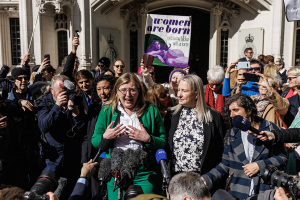No constitutional right to physician-assisted suicide, Massachusetts' top court rules

The top court in Massachusetts has ruled that doctors have no right to prescribe lethal drugs for patients with terminal illnesses under the state’s constitution, dealing a blow to advocates who hoped the state would be the first in the nation to guarantee such a constitutional right.
The Supreme Judicial Court of Massachusetts ruled 4-2 against the lawsuit filed in 2016 by a doctor seeking to overturn the commonwealth’s common-law prohibition on physician-assisted suicide. The ruling leaves doctors who prescribe such drugs liable to be prosecuted for manslaughter.
“Although we recognize the paramount importance and profound significance of all end-of-life decisions, after careful consideration, we conclude that the Massachusetts Declaration of Rights does not reach so far as to protect physician-assisted suicide,” the majority opinion states.
“We conclude as well that the law of manslaughter may prohibit physician-assisted suicide, and does so, without offending constitutional protections.”
The lawsuit was filed by Dr. Roger Kilger, a retired doctor diagnosed with stage 4 cancer, and a doctor who feared he could be prosecuted for prescribing lethal drugs to terminally-ill patients.
In a separate opinion concurring in part and dissenting in part, Justice Dalila Wendhlandt contends that the “application of criminal laws to physician-assisted suicide will not always pass constitutional muster even under the relatively meager bar of rational basis review.”
“In particular, when a terminally ill, mentally competent patient approaches the final stage of the dying process, accompanied by unbearable pain that cannot be alleviated by palliative care short of sedation to unconsciousness, the rational basis calculus necessarily changes,” Wendhlandt wrote.
The Alliance Defending Freedom, a legal nonprofit that filed an amicus brief in favor of the state law on behalf of the Euthanasia Prevention Coalition USA, believes the court preserved the “well settled” distinction between “withdrawing or refusing life-sustaining medical treatment” and “attempting suicide.”
“Every human life — regardless of disability or illness — has immeasurable value, and the government must do all it can to protect life, especially for the most vulnerable who cannot advocate for themselves,” said ADF Senior Counsel Chris Schandevel, who was granted permission to participate in oral arguments in March.
“Physician-assisted suicide radically degrades the practice of medicine. Patients should be able to trust their doctors to support and care for them. Offering terminally ill or disabled patients a ‘quick exit’ through death-inducing drugs destroys that trust.”
The 70-year-old Kliger said in an interview with The Associated Press that “People are going to die suffering because of this decision.”
“I will continue urging lawmakers to respect the bodily autonomy of dying Massachusetts residents by passing the End of Life Options Act,” he said.
A spokesperson for Attorney General Maura Healey’s office said in a statement that they are pleased with the court’s ruling affirming its position that the state legislature is the “most appropriate place to have a discussion about this important public policy issue.”
“AG Healey has said she supports legislative action to allow medical aid in dying, provided it includes sufficient safeguards for both patients and providers,” the statement reads.
The lawsuit comes as at least 10 states have enacted legislation to legalize euthanasia and physician-assisted suicide since the authorization of the Oregon “Death with Dignity Act" in 1994.
Oregon’s law has been scrutinized by many over the years. It gained media attention in 2014 after 29-year-old Brittany Maynard, diagnosed with terminal brain cancer, announced in an emotional video that she had moved to Oregon to utilize the state’s assisted suicide law. She was prescribed medication enabling her to die whenever at the time of her choosing. She died by assisted suicide on Nov. 1, 2014.
In Vermont, critics have warned that the state's new assisted suicide law eliminates the requirement for in-person doctor consultation.
In Canada, the healthcare system offers eligible patients the option for assisted suicide, known as MAiD or "medical aid in dying.”
As The Christian Post reported, a church in Canada held an assisted suicide ceremony for a member diagnosed with ALS earlier this year. Rev. Dawn Rolke of Churchill Park United Church of Winnipeg told CP that it “seemed appropriate” for the church to hold the ceremony.
“For us, it was perfectly natural to hold this service for Betty in our sanctuary because death is a natural part of life and Betty had lived a good part of her adulthood in this faith community,” Rolke said. “Hers was a growing, changing spirituality; her faith was feisty, fierce and passionate, like Betty herself.”





























